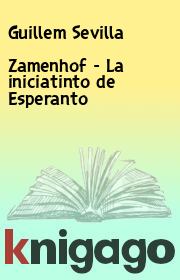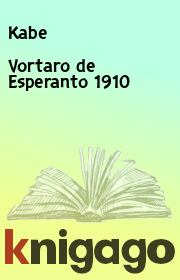Ulrich Lins - Esperanto the Dangerous Language
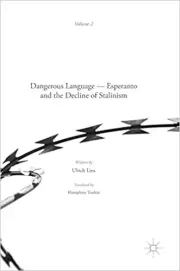 | Название: | Esperanto the Dangerous Language |
Автор: | Ulrich Lins | |
Жанр: | Старинная литература | |
Изадано в серии: | неизвестно | |
Издательство: | неизвестно | |
Год издания: | 2017 | |
ISBN: | неизвестно | |
Отзывы: | Комментировать | |
Рейтинг: | ||
Поделись книгой с друзьями! Помощь сайту: донат на оплату сервера | ||
Краткое содержание книги "Esperanto the Dangerous Language"
This work is subject to copyright. All rights are solely and exclusively licensed by the Publisher, whether the whole or part of the material is concerned, specifically the rights of translation, reprinting, reuse of illustrations, recitation, broadcasting, reproduction on microfilms or in any other physical way, and transmission or information storage and retrieval, electronic adaptation, computer software, or by similar or dissimilar methodology now known or hereafter developed.
Читаем онлайн "Esperanto the Dangerous Language". [Страница - 2]
- 1
- 2
- 3
- 4
- . . .
- последняя (95) »
The extraordinary story ofEsperanto's encounter with twentieth-century dictatorship raises many questions—questions that I attempt to address in this study. What was it that was so provocative about Esperanto? Was it the very existence of Esperanto as an international language or primarily the way in which it was used in practice? What was the political and social milieu in which Esperanto canvassed for its goal of a second language for all people? What role was played by adaptability and self-confidence in dealing with governments from which the movement hoped for support but which it nevertheless had no wish to rely on? What was the relationship between a 'neutral' language on the one hand and 'idealistic' enthusiasts on the other? How did the Esperantists relate to supporters of other goals aimed at worldwide solidarity, like pacifists, socialists and communists? And how did the Esperantists react to the—often unexpected—conflicts with their opponents? What lessons did they carry away from the persecutions concerning their own definition of the Esperanto movement?
To explain the difficult position of Esperanto on the battlefield of i deologies and power interests, I have tried to clarify the political development of the countries in question, particularly Tsarist Russia, Germany, the Balkan countries, China and Japan, and the Soviet Union. I hope that in this way I can shed some light on the history of the decades since 1887—from a different perspective. My basic intention has been precisely that: to show how much suspicion, hatred and resis- tance has been generated by an effort to establish non-discriminatory interpersonal communication—an effort which was often identified with specific groups (Jews, communists, petty bourgeois) but in fact repre- sents a ielf-iufficient integrative internationalism and, as such, refuses to conform to the usual categories. Thus the history of the persecution of Esperanto might stimulate conclusions that go beyond the subject of Esperanto—conclusions that maintain their validity in the present time.
Thus, the revised Esperanto edition[2] on which this English transla- tion is based takes into account numbers of newly discovered docu- ments, among them materials from the Soviet NKVD to which Russian researchers had access as of 1990 for a (limited) time. I have also tried to take into consideration relevant studies that have appeared in various countries and languages over the past 25 years. At the same time, I have decided to reduce the length of some chapters, for example in the section on the Soviet Union, and also discussion of persecutions of Esperantists aimed primarily at their political activities, for example in parts of Eastern Europe, and in China and Japan.
My research has benefited greatly from material preserved in the German Federal Archive in Berlin, including papers newly available following German reunification. For several years my work has been assisted by con- sulting the Hector Hodler Library in Rotterdam, the Planned Language Collection and Esperanto Museum of the Austrian National Library in Vienna, and the library of the Japanese Esperanto Institute in Tokyo. Also extremely helpful has been my easy access to the University Library and the Friedrich Ebert Foundation Library, both in Bonn. I remember with particular thanks the fact that Teo Jung, before his passing in 1986, presented me with collections of Esperanto periodicals from the 1920s and 1930s and that Kurisu Kei put at my disposal particularly valuable material on the Soviet and Japanese Esperanto movements. I am grateful to SAT and Eduard Borsboom who allowed me to consult unpublished letters to and from Eugene Lanti. In addition to those mentioned, I owe thanks to many people, among them former Soviet citizens, who provided me with information and clarifications that helped in the preparation of the present text. The names of many of these individuals are mentioned in the footnotes. Finally, I am grateful to all those who helped in the technical preparation of the book.
I cannot begin to measure the constant support provided by my wife Akie and from which the present study has greatly benefited. And I am very grateful to Professor Humphrey Tonkin, who has long taken an interest in publishing an English version of the book and who has devoted himself to the task of translating it with unmatchable care and enthusiasm. My thanks go also to Ulrich Becker, who has hunted down references to English-language translations of works cited.
October 2015 U.L.
Contents
Part I A Suspicious New Language 1
The Emergence of Esperanto 3
War and Its Aftermath 35
Part II 'Language of Jews and Communists' 85
The Rise of a New Enemy 87
An AUy of World Jewr/ 109
Part III 'Language of Petty Bourgeois and Cosmopolitans' 157
Finding a Place for Esperanto in the Soviet Union 159
Schism and Collapse 205
Socialism and International Language 237 Bibliography 279 AuthorIndex 287 Subject Index 295
Abbreviations
ASE Asocio de Sovetiaj Esperantistoj (Association of Soviet Esperantists)
BEA Bulgara Esperantista Asocio (Bulgarian Esperantist Association)
BIL P.E. Stojan, Bibliografio de internacia lingvo (Geneva: UEA, 1929;
reprint Hildesheim & New York: Georg Olms, 1973) BLEA Brita Laborista Esperanto-Asocio (British Workers' Esperanto Association)
CK Centra Komitato (Central Committee)
CPSU Communist Party of the Soviet Union
EACSR Esperanto-Asocio en Cehoslovaka Respubliko (Esperanto
Association in the Czechoslovakian Republic) EdE L. Kokeny & V. Bleier (ed.), Enciklopedio de Esperanto (Budapest:
Literatura Mondo, 1933-1934, reprints 1979 and 1986) EeP Ivo Lapenna and others, Esperanto en perspektivo. Faktoj kaj analizoj
pri la Internacia Lingvo (London & Rotterdam: UEA, 1974) EKRELO Eldon-Kooperativo por Revolucia Esperanto-Literaturo
(Publishing Cooperative for Revolutionary Esperanto Literature) GDR German Democratic Republic
GEA Germana Esperanto-Asocio (German Esperanto Association)
GLEA Laborista Esperanto-Asocio por la Germanlingvaj Regionoj;
Germana Laborista Esperanto-Asocio (German Workers' Esperanto Association) GPU Gosudarstvennoe politicheskoe upravlenie (State Political
Directorate, i.e. the Soviet secret police 1922-23)
IAREV Internacia Asocio de Revoluciaj Esperanto-Verkistoj (International
Association of Revolutionary Esperanto Writers) ICK Internacia Centra Komitato de la Esperanto-Movado
(International Central Committee of the Esperanto Movement) IEL Internacia Esperanto-Ligo (International Esperanto League)
IPE Internacio de Proleta Esperantistaro (Proletarian Esperantist
International)
ISA International Federation of the National Standardizing Associations
ISE Internacio de Socialistaj Esperantistoj (Socialist Esperantist
International) IWA International Workingmen's Association
JEI Japana Esperanto-Instituto (Japanese Esperanto Institute)
JEL Jugoslavia Esperanto-Ligo (Yugoslav Esperanto League)
KP Komunista Partio (Communist Party)
LEA Laborista Esperanto-Asocio (Workers' Esperanto
--">- 1
- 2
- 3
- 4
- . . .
- последняя (95) »
Книги схожие с «Esperanto the Dangerous Language» по жанру, серии, автору или названию:
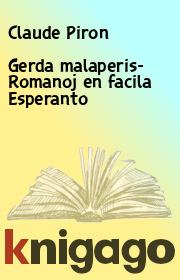 |
| Claude Piron - Gerda malaperis- Romanoj en facila Esperanto Жанр: Старинная литература Год издания: 101 |
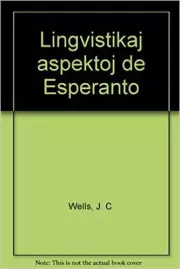 |
| J. C. Wells - Lingvistikaj aspektoj de Esperanto Жанр: Старинная литература Год издания: 1989 |


